Voices at the Immigrant Workers Centre on deindustrialization and dissent in Montreal’s Garment District
In 2007, immigrant workers at the Montreal-based garment manufacturer Lamour were “unceremoniously laid-off” after having worked at the company for decades. As the company prepared to shutter its domestic production activities, Lamour gradually laid off nearly 500 of its Montreal workforce starting in 2006. The gradual nature of layoffs was strategic: had Lamour decided to close its factory all at once, they would have had to pay their workers collective layoff benefits.
During this period, workers publicly denounced the abysmal labour conditions at Lamour, where they had been locked inside the factory during the night shift, forced to eat meals at their workstations, and were not paid when their machines broke down and they failed to meet their quotas. And, to worsen Lamour employees’ situation, their union was widely understood to be a pro-management or company union that did not advocate for workers’ real demands. Over 2007 and 2008, laid off workers and community organizers at the Immigrant Workers Centre (IWC) engaged in a struggle to gain compensation for laid off Lamour employees. They jointly pressured the Labour Relations Tribunal (Tribunal administratif du travail) and the Labour Standards Board (Commission des normes, de l’équité, de la santé et de la sécurité du travail, CNESST), demanding that the layoffs be treated as collective so that workers could receive fair compensation. In the end, many Lamour employees received an increased benefits package.
For this project, Stefan Christoff and Lauren Laframboise conducted short oral history interviews with four IWC organizers and volunteers who were involved in the Lamour struggle in consultation and collaboration with the community organization. IWC community organizers Mostafa Henaway, Joey Calugay, Yumna Siddiqi and Bita Mary Eslami reflected on their work with the Lamour campaign, offering insights on the power of community organizing and the challenges that immigrant workers face in deindustrializing sectors. The interviews will be broadcasted on the community radio show Free City Radio throughout September and October 2023. Based at CKUT 90.3 FM, Free City Radio is hosted and produced by Stefan Christoff and is syndicated at seven campus and community radio stations across Canada, broadcast on Radio AlHara in occupied Palestine, and is also released as a podcast on Spotify and Apple Podcasts. Stefan is an elected community board member at the IWC for 2022/2023.
These interviews aim to document the broader fight for Lamour workers’ compensation, putting community organizer and immigrant workers’ experiences at the forefront of the struggle against closures in Montreal’s garment industry. The interviews share important perspectives on more recent organizing efforts in the context of the slow and gradual process of deindustrialization in Montreal’s garment industry, where employers have frequently found ways to circumvent collective agreements and labour laws to avoid paying workers fair compensation in the wake of closures. In these interviews we hear not only of injustice, but also stories about collective resilience and resistance.
Panel Discussion at the Centre for Oral History and Digital Storytelling, March 28, 2024:
Organizer Biographies
Joey Calugay is the Coordinator and lead organizer for temporary foreign workers in Montreal and regions at the Immigrant Workers Centre.
Mostafa Henaway, a Canadian-born Egyptian, is a long-time community organizer at the Immigrant Workers Centre in Montreal, where he has been organizing for justice for immigrant/migrant workers for over two decades. He is also a researcher and PhD candidate at Concordia University.
Yumna Siddiqi is an Associate Professor of English at Middlebury College, where she specializes in postcolonial literary studies. Her current research is on postcolonial literature, migrants and the city. She has been a volunteer at the IWC-CTI since 2006, and seen the Center grow from the little NGO that could to an immigrant labour power house.
Bita Mary Eslami is an Irani exile and a forever Montrealer. For two decades she has supported non-status and migrant families, victims of police violence, promoted child care and worked to advance the international BDS movement in solidarity with Palestinians.
Related Projects
Labour in the Shadows Podcast Episode
This special edition of the RAAH Podcast features audio from a walking tour titled Labour in the Shadows that took place in the spring of 2024 in Montreal’s Garment District (also known as Chabanel or the Cité de la Mode). The tour highlighted the long history of labour action in the Chabanel industrial district, and featured interventions from historians, organizers, and artists involved in documenting these struggles. This podcast also contains excerpts from the interviews conducted as part of the Voices of the IWC project. It was produced by Stefan Christoff, mixed and edited by Joseph Sannicandro, supported and distributed by The Raah Lab.
Interview with Tess Tessalona, co-founder of the Immigrant Workers Centre
Stefan Christoff conducted an interview with Tess Tessalona, co-founder of the Immigrant Workers Centre, published with the Media Co-op. The interview provides context on the longer history of the IWC and how the Lamour campaign fits within its broader organizing efforts.
Further Reading
Mostafa Henaway, Essential Work, Disposable Workers: Migration, Capitalism, and Class, (Fernwood, 2023).
Mostafa Henaway and Norma Rantisi, “The Reconstruction of Montreal’s Chabanel District,” in A Citizen’s Guide to City Politics, edited by Eric Shragge, Jason Prince, and Mostafa Henaway, (Montreal: Black Rose Books, 2021).
Justice for Lamour Textile Workers, Immigrant Workers Centre, March 22, 2013.
Mike King, Ex-workers challenge Lamour, The Montreal Gazette, July 22, 2008.
Eric Shragge, Activism and Social Change: Lessons for Community Organizing, 2nd ed. (University of Toronto Press, 2013).
“IWC 2008,” short documentary. Coverage of the Lamour campaign from 8:53 onwards.
This project was made possible with funding from Deindustrialization and the Politics of Our Time and the Canadian Committee on Labour History (CCLH).

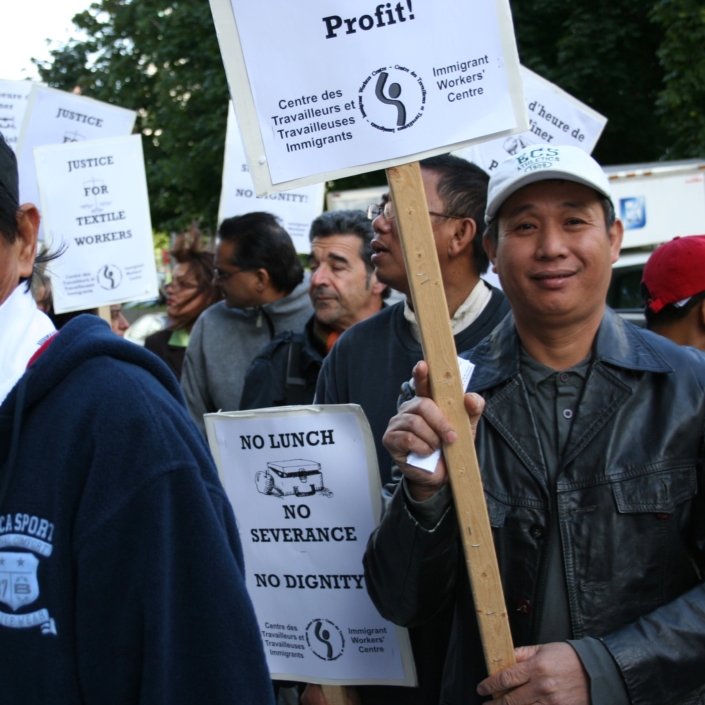
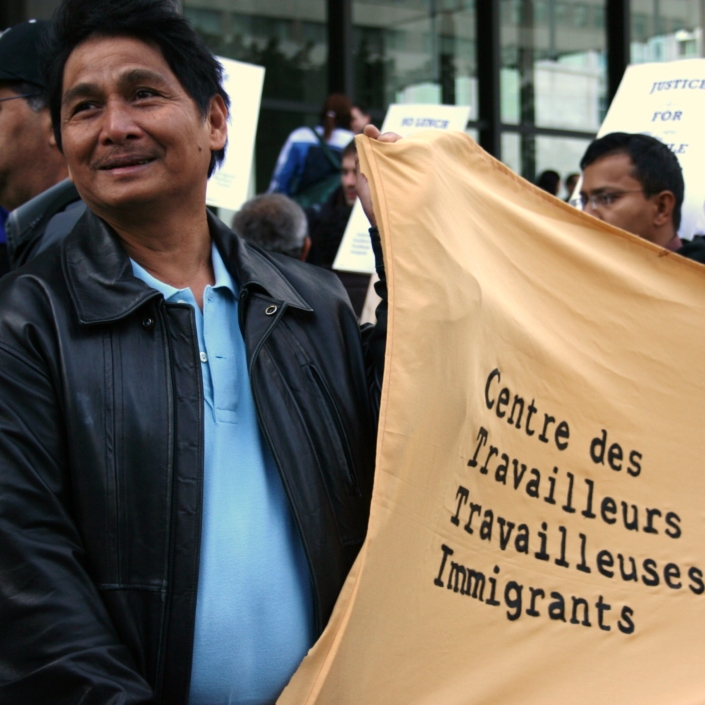
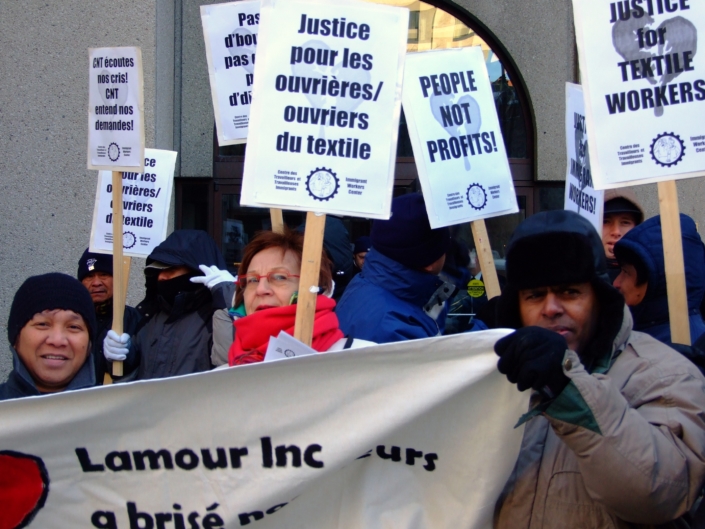
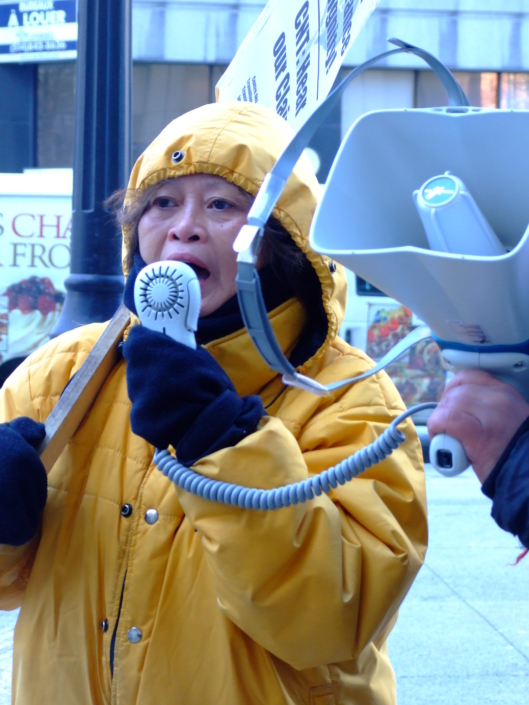
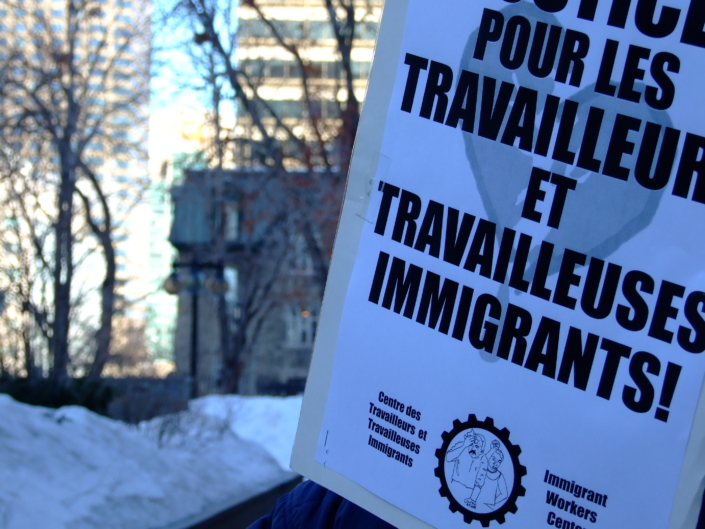



 Bouchecl, Wikimédia, Creative Commons Attribution-Share Alike license
Bouchecl, Wikimédia, Creative Commons Attribution-Share Alike license